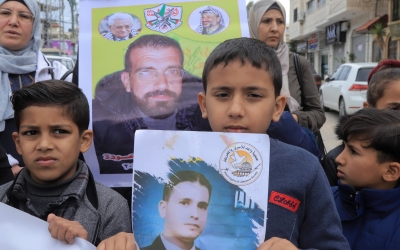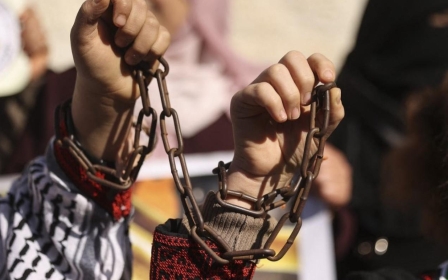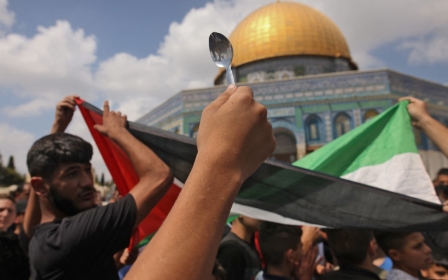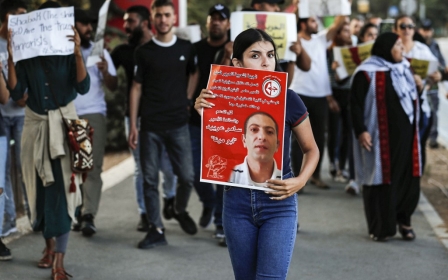How Israel's war on Palestinian prisoners could create more grounds for instability
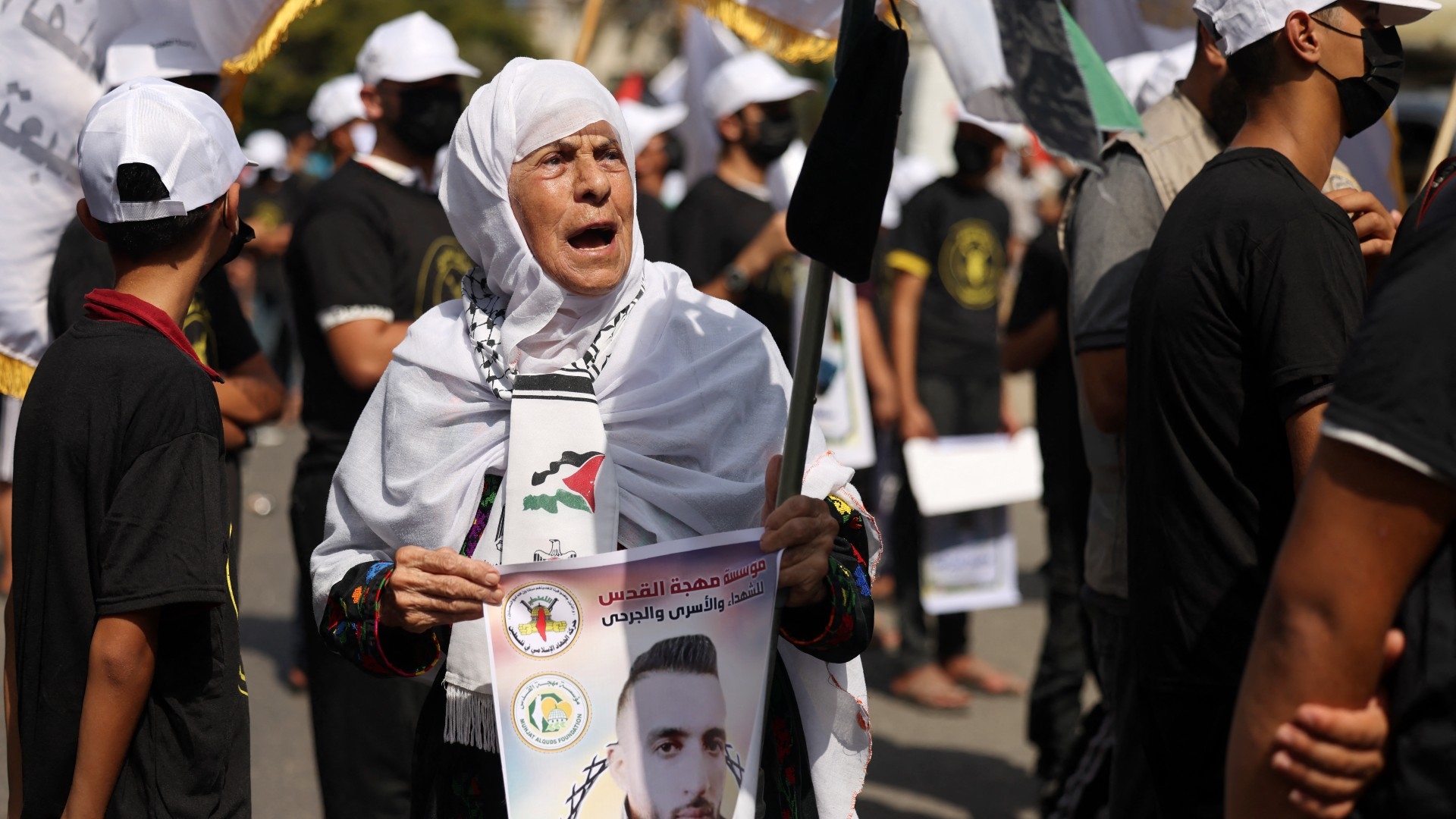
The scene looked unreal, but it was on brand for the most far-right government in Israel's history. National Security Minister Itamar Ben Gvir sat at a desk, speaking jubilantly in front of a large tray of food. Before stuffing his face with fresh bread, he bragged that Palestinian prisoners were now banned from baking bread, adding that this measure was "only the beginning".
The incident earlier this year provoked no international backlash, criticism or pressure. So Ben Gvir began implementing even more cruel, degrading and inhumane measures against Palestinian prisoners, eventually pushing nearly 1,000 of them to launch an open-ended hunger strike last month to protest the dire conditions.
That only prompted Ben Gvir to squeeze them even more, arbitrarily reducing family visits for those jailed over "security offences" to once every two months. Palestinian prisoners had plans to collectively declare another hunger strike on 14 September but suspended it after Israeli jail authorities cancelled the decision to restrict prisoners' family visits.
These two hunger strikes are the biggest in years for Palestinians, many of whom are imprisoned without having had a fair trial. Under Israel's discriminatory system, Palestinians tried in military courts have a conviction rate of 99.7 percent, while Israelis are very rarely convicted over attacks on Palestinians. About a quarter of Palestinian prisoners are held without charge or trial in a practice known as "administrative detention".
Palestinians also receive much harsher sentences than Jewish Israelis for the same offences. A Palestinian teenager throwing rocks at Israeli military vehicles could face up to 20 years in prison, while Israeli settlers throwing rocks at Palestinians might only receive community service. Palestinian actions are often treated as "security offences", likening them to terrorism and bringing harsher sentences.
New MEE newsletter: Jerusalem Dispatch
Sign up to get the latest insights and analysis on Israel-Palestine, alongside Turkey Unpacked and other MEE newsletters
Having campaigned on making life increasingly difficult for Palestinian prisoners, Ben Gvir swiftly delivered on this promise after taking office, through measures such as reducing shower time, increasing the use of solitary confinement and launching more invasive searches of inmates.
He has also cancelled dental care benefits for Palestinian prisoners, requiring them to pay out of pocket for dentist visits. In addition, he has curtailed early releases for some prisoners, despite prison authorities pointing to a problem of overcrowding.
Unnecessary suffering
Ben Gvir is also reportedly planning to reduce the types of shampoo available to inmates in the prison cantinas; restrict their access to television; cut back on time allowed in the prison yard; and limit the availability of lamb meat.
Cruelty is precisely the point of these unprovoked, punitive measures against captive Palestinians. These decisions, which cause unnecessary suffering and tension, have no clear security value nor any legitimate goal, other than to boost the extremist minister's approval ratings. Ben Gvir is making a name for himself as a tough politician who is cracking down on Palestinians, showing them Israel's full might and strength.
Israel also routinely uses imprisonment as a tool of suppression, intimidation and harassment
Israeli opposition leaders can see through these cheap stunts. Former Prime Minister Yair Lapid has called Ben Gvir a "TikTok clown".
Next on the national security minister's list of electoral promises is to legislate the death sentence exclusively against Palestinians, after Israel earlier this year passed a law allowing for citizenship to be stripped from Palestinians who have been convicted of "terrorism" offences and received compensation from Palestinian authorities.
It is important to note that Israel's latest series of punitive and cruel measures against prisoners apply only to Palestinians, and not to Jewish Israelis. This is because in the eyes of the ruling coalition, only Arabs can be "terrorists".
Deep immorality
The discriminatory nature of these measures highlights their illegality and immorality. Such blatant inequality before the law - in terms of the right to a fair trial and legal representation, access to justice and humane treatment - has contributed to the finding from major international and regional rights groups that Israel maintains a policy of apartheid.
As of this past June, there were about 4,900 Palestinian "security prisoners" in Israel, including more than 1,100 administrative detainees. Israel refuses to recognise Palestinian prisoners as having the status of prisoners of war, instead treating them as politically motivated criminals or terrorists. The state deprives them of their rights systematically, including the right to receive family visits.
Israel also routinely uses imprisonment as a tool of suppression, intimidation and harassment, as well as to disrupt Palestinian political life. This includes arresting Palestinian politicians, such as Khalida Jarrar, who was held under administrative detention and deemed by Amnesty International to be a prisoner of conscience.
Israel's cruel practices of unjustly detaining and imprisoning Palestinians, and subjecting them to harsh conditions of confinement, will only further fuel the conflict and create more grounds for instability.
As the occupying power, Israel bears full responsibility for the Palestinian population in the occupied territories. It has a set of obligations towards Palestinian prisoners, including respecting their rights to life, health and dignity. Israel must end all forms of violence and discrimination against Palestinian prisoners.
The views expressed in this article belong to the author and do not necessarily reflect the editorial policy of Middle East Eye.
Middle East Eye delivers independent and unrivalled coverage and analysis of the Middle East, North Africa and beyond. To learn more about republishing this content and the associated fees, please fill out this form. More about MEE can be found here.



